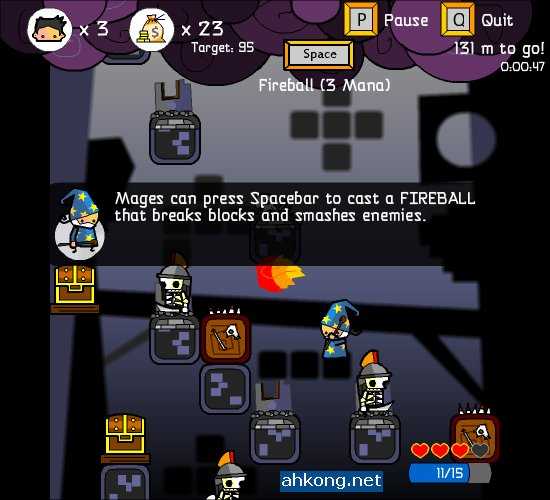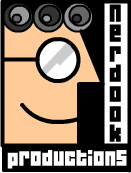
Featured Blog | This community-written post highlights the best of what the game industry has to offer. Read more like it on the Game Developer Blogs or learn how to Submit Your Own Blog Post
Making the Jump: my journey from Flash games to desktop games!
A Flash developer documents the early days of his decision to expand from Flash game development to the harsher world of making full desktop games!

A few years ago, I made the huge decision to leave a comfortable, well-paying engineering job with a fairly large oil and gas firm to pursue a career as a game developer. In my country, Malaysia, that's a pretty strange career choice, in a land where many parents consider engineering and medicine as coveted jobs for their children.
The Land of Browser Games!
I don't make a life decision like that very lightly, of course, and I was already making sponsored games in my spare time by the time I left my job. At the cost of having very little sleep over the nights and weekends, I had been beavering away, learning game development skills on the side, reading articles from Gamasutra, watching how the bigger developers make money from the Flash gaming market.
First, a quick summary of my understanding of the Flash game market and the game developer's place in it, for those who are considering it as a career choice.
The biggest advantage browser games have is their huge reach: a successful game can easily reach tens of millions of plays, since every computer has a browser and the games are often designed to be quickly loaded and played within a short ten minute break. Most of this traffic comes from large Flash game portals, such as Kongregate, Newgrounds and Armorgames, just to name a few. These portals provide the hosting and pay the considerable bandwidth costs, while developers provide the content and generate traffic to the portals. The main income for many Flash game developers comes from sponsorships by the portals, where a certain amount of money is paid (the actual amount varies from portal to portal, and from one game to another) in exchange for including a logo and link to the sponsors. As the game is spread far and wide throughout the expanse of the Internet, the sheer number of players and the probability curve dictates that SOME of them will inevitably click through to the portals, which gives value to the games. The sponsorship figures for the most popular games can be found on Gamasutra, and are often lucrative enough to keep the developers going for a while.
My Early Years
I read in a PC Gamer article about the existence of Kongregate back when it first started in 2007, and decided to try my luck with a few unsponsored games. They were uniformly terrible, and ended up earning a small pittance for me (a quick check reveals that my very first game has earned me less than $30 in the seven years since it was uploaded!), but I am grateful to Kongregate for giving me that initial exposure I needed. Your first game always seem amazing to you, until you put it in front of a wider audience: while I was initially a little upset over the criticisms and harsh feedback I received, I realise now that this was completely normal, my games really WERE that bad, and prepared me to deal positively with negative feedback in the years ahead.
I remember my very first sponsored games: Zombies Took My Daughter, sponsored by ArcadeBomb, and Vertical Drop Heroes, sponsored by NinjaKiwi through the FlashGameLicense site. I owe all of them my eternal gratitude for starting me on the path I am on now! When I received my first payment for the games, I told my parents and my girlfriend (now my wife), and they ALL expressed skepticism at the money, worrying that I was about to fall victim to some sort of Western hoax. It's all a bit funny now that I look back on those days!

Zombies Took My Daughter: A procedural zombie survival game I made in 2010!

Vertical Drop Heroes: a procedural platform game, and my second sponsored Flash game
2010-2012: The Years of Nerdook Games
When it became clear that the sponsorship payments for the games were not some kind of elaborate hoax, I began my game making career in earnest. For the next few years, making games became a part-time job for me, with my nights and weekends filled with game development work. To save costs, I had to learn EVERYTHING: coding, game design, art, animation, sounds and music. In the end, I realized musical talent is not something that I was able to honestly say I have, and outsourced it to composers recruited from Newgrounds (and on a few occasions, my then-girlfriend-now-wife, who is a musical genius).
The old adage is "make hay while the sun shines", and 2010-2012 appeared to be the golden years for both me and Flash gaming in general. I managed to make a game every 2 months or so, almost all of them sponsored by Kongregate, and while only one game was a huge success (Monster Slayers: 4.1 million views on Kongregate alone, and over 10 million worldwide to date), the rest were moderate successes. Even today, I had no idea how I really did all of it, except maybe from sheer determination to see each project finished. As of today, I have eighteen Kongregate sponsored games on their site, with a combined total of 25 million plays.

Some of the key strategies I used throughout these years were:
a) Keep it simple: Each game had a clear core concept, and this was quickly built into a prototype and iterated upon until it's good enough to be published. As far as possible, I resisted the temptations to add too many things to each game, and focused on making that core loop simple and fun.
b) Learn and adapt: With every game I made, I did my best to use each one as a learning tool for the next game, building a common library of functions and tools, and researching better and more efficient ways to use the resources I have. Better collision detections, improved pathfinding, better procedural algorithms, and animation tricks were all things that I learned along the way, sometimes from other people, and sometimes through my own experimentation.
c) Build the fanbase: I have to admit, my marketing skills are not as good as they could be, but I always did my best to engage my fans honestly and openly, doing my best not to be dragged into countless arguments with them, and sharing the rationale behind some of my game design decisions. I made a lot of good friends on the Kongregate chatrooms, gathered all my fans slowly but surely on my own Facebook page, and recruited some of them as beta testers for upcoming games.
Making the Jump
I left my job in early 2011, and on Christmas Eve that year, I got married. My daughter was born on 31st December 2012, and with the flexibility I have working from home, I decided to take on extra duties as a stay at home parent while the wife goes to work.
Taking care of a child always takes precedent over my work, so I am only able to work on my code while someone else is taking care of her, or when she finally falls asleep. It's amazing how much energy a little child has! As the months went on and my bank account dwindled from the reduced productivity, I made a major decision: maybe it's time to leverage the things I've learned from Flash development into bigger things.
And so I started learning again, first experimenting with Starling on Flash, then learning Gamemaker Studio. I decided to make my very first desktop game in Gamemaker, since it's similar enough to Flash and Actionscript. I decided to return to my roots for this "career reboot" of sorts: it's time to modernise Vertical Drop Heroes into a roguelite platformer that incorporates everything I've learned in the last seven years!

And so I beavered away again, making a playable version of the game, built an early alpha demo for download, crafted a trailer, and popped it into a brand new Steam Greenlight page, where it now languishes, awaiting the approving votes of the masses, like a thousand other indie games.
So here I am today! I am still working on the game, but most of my time is now spent trying to convince others to give it a try, checking feverishly at the daily votes, wondering why the vote ratio is dropping, and all the other borderline obsessive behaviours that every independent game developer with a pending Greenlight project totally understands.
This game development career thing has been a crazy adventure and a wild ride, with plenty of challenges and its own unique brand of ups and downs. But if you're considering it as a career, I'd say go for it, but do it with your eyes wide open, do your research, have a backup plan if things go south, and always keep that passion for games burning through the dark hours and the endless problems you will encounter along the way.
Will I succeed? Who knows? The future is as uncertain as ever, but I'm happy with what I've done so far, and it looks like an exciting year ahead for PC gaming in general. It's always been strange career choice, but I wouldn't have traded it for the world!
Oh, and here's that plug for my Greenlight page: http://steamcommunity.com/sharedfiles/filedetails/?id=205631999 ;)
Read more about:
Featured BlogsAbout the Author(s)
You May Also Like







.jpeg?width=700&auto=webp&quality=80&disable=upscale)








